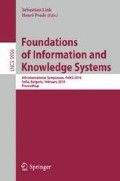Abstract
As a subfield of artificial intelligence, qualitative reasoning is about that kind of knowledge representation languages and automated deduction methods that is used by scientists and engineers when a precise quantitative description of the physical bodies is not available or when a complete quantitative calculation of their relationships is not feasible. A special area of qualitative reasoning is concerned with the qualitative aspects of representing and reasoning about spatial entities. Applications of qualitative spatial reasoning (QSR) can be found in natural language processing [1], spatial information systems [8], etc. They have given rise to numerous knowledge representation languages and automated deduction methods for space.
Access this chapter
Tax calculation will be finalised at checkout
Purchases are for personal use only
References
Asher, N., Vieu, L.: Toward a geometry of common sense: a semantics and a complete axiomatization of mereotopology. In: Proceedings of the 14th International Joint Conference on Artificial Intelligence, pp. 846–852. Morgan Kaufmann, San Francisco (1995)
Balbiani, P., Condotta, J.-F., Fariñas del Cerro, L.: A model for reasoning about bidimensional temporal relations. In: Proceedings of the 6th International Conference on Knowledge Representation and Reasoning, pp. 124–130. Morgan Kaufmann, San Francisco (1998)
Challita, K.: Reasoning with lines in the Euclidean space. In: Proceedings of the 21st International Joint Conference on Artificial Intelligence. Association for the Advancement of Artificial Intelligence, pp. 462–467 (2009)
Cohn, A., Gotts, N.: The ‘egg-yolk’ representation of regions with indeterminate boundaries. In: Geographic Objects with Indeterminate Boundaries, pp. 171–188. Taylor & Francis, Abington (1996)
Dimov, G., Vakarelov, D.: Contact algebras and region-based theory of space: a proximity approach — I. Fundamenta Informaticæ, 209–249 (2006)
Düntsch, I., Winter, M.: A representation theorem for Boolean contact algebras. Theoretical Computer Science 347, 498–512 (2005)
Gerevini, A., Renz, J.: Combining topological and size information for spatial reasoning. Artificial Intelligence 137, 1–42 (2002)
Laurini, R., Thompson, D.: Fundamentals of Spatial Information Systems. Academic Press, London (1992)
Ligozat, G.: Reasoning about cardinal directions. Journal of Visual Languages and Computing 9, 23–44 (1998)
Randell, D., Cui, Z., Cohn, A.: A spatial logic based on regions and connection. In: Proceedings of the 3rd International Conference on Knowledge Representation and Reasoning, pp. 165–176. Morgan Kaufmann, San Francisco (1992)
Renz, J., Nebel, B.: On the complexity of qualitative spatial reasoning: a maximal tractable fragment of the region connection calculus. Artificial Intelligence 108, 69–123 (1999)
Stell, J.: Boolean connection algebras: a new approach to the region-connection calculus. Artificial Intelligence 122, 111–136 (2000)
Author information
Authors and Affiliations
Editor information
Editors and Affiliations
Rights and permissions
Copyright information
© 2010 Springer-Verlag Berlin Heidelberg
About this paper
Cite this paper
Balbiani, P. (2010). Tools and Techniques in Qualitative Reasoning about Space. In: Link, S., Prade, H. (eds) Foundations of Information and Knowledge Systems. FoIKS 2010. Lecture Notes in Computer Science, vol 5956. Springer, Berlin, Heidelberg. https://doi.org/10.1007/978-3-642-11829-6_1
Download citation
DOI: https://doi.org/10.1007/978-3-642-11829-6_1
Publisher Name: Springer, Berlin, Heidelberg
Print ISBN: 978-3-642-11828-9
Online ISBN: 978-3-642-11829-6
eBook Packages: Computer ScienceComputer Science (R0)

